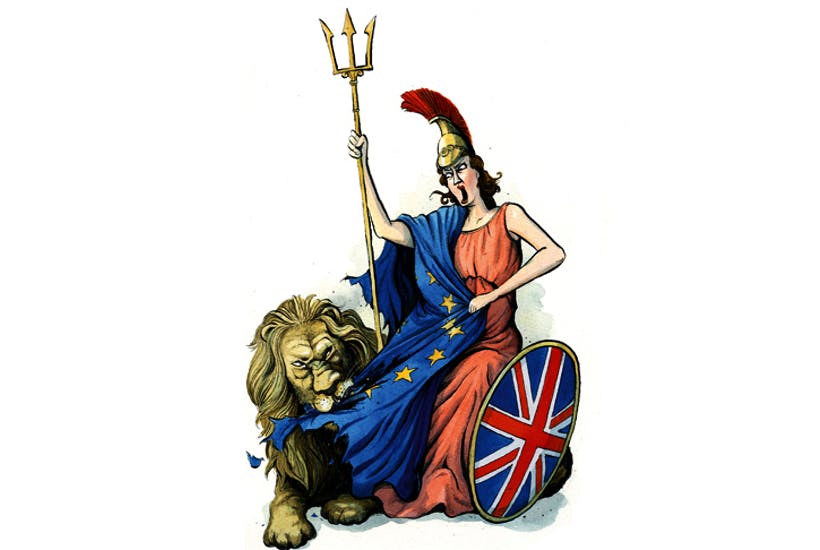Brexit must happen. Of course it must, for the people have decreed it should and, in this instance, their command cannot, as it can be in other circumstances, be countermanded. That leaves ample room for argument over the precise shape of Brexit – for it turns out there are many kinds of Brexit – but the essence of the matter is clear: Brexit must mean Brexit.
It is possible to be sanguine about this and to recognise that even as the net impact of Brexit is likely to be negative in an economic sense, some sectors of the economy may benefit from it. In many areas, there is undoubtedly an opportunity to do some things differently and, who knows and with some luck, perhaps even do them better. The sky may darken; it should not fall.
But there is, once again, a difference between Brexit and Brexiteers. The action is forgivable, the people demanding it are not. One thing, above all, has become clear: the majority of Leave voters do not love the United Kingdom of Great Britain and Northern Ireland.
I imagine many Brexiteers will bristle at this as they always do when inconvenient or dispiriting truths are illuminated. This is not my Brexit, they say, so how dare you suggest it is. Doubtless in individual cases this is so; referendums are very personal epiphanies after all. But collectively, the benefit of the doubt ran out long ago.
Happily – which is to say, miserably – we have ample supplied of empirical evidence to demonstrate the degree to which pro-Brexit voters love their country so much they’re prepared to sacrifice it on the Brexit altar they have built for themselves. This, I suppose, is how you prove your devotion.
Lord Ashcroft’s latest polling confirms that Brexiteers like an idea of Britain more than they like Britain itself. That is to say, they do not think the integrity and survival of Britain more important than Brexit. The noble lord asked an admittedly hypothetical question: “If it were not possible to do both, which of the following would you choose to do? A) Leave the European Union or B) Keep England, Scotland, Northern Ireland and Wales together in the United Kingdom?”
63 per cent of Leave voters across Britain chose Brexit over the Union. Fifty per cent of Labour Leavers thought Brexit the more vital issue as did 73 per cent of those voters who support the Conservative and Unionist (sic) party. Had Lord Ashcroft’s polling been restricted to England, I suspect those numbers would be even higher. As it is, barely one in five Tory Leavers thinks the UK more important than Brexit.
We have other evidence to support that contention. The latest research conducted by the Future of England survey, a project run by the Universities of Cardiff and Edinburgh (which is, itself, revealing) reported that more than 80 per cent of Leave voters in England thought Brexit more important than the Northern Irish peace process or the survival of the Union.
Now you may object that Brexit is with us now and these other questions are merely hypothetical. Brexit is a first order issue and everything else is of only secondary importance. There may be something to this. If circumstances were different, attitudes might be too.
And yet the general direction of sentiment is clear. Brexit has become England’s white whale. A beast to be pursued at all and any cost and damn the consequences. Naturally, like many dismal causes, this one comes wrapped in a flag and loudly proclaims its love of country and its unfettered belief in a glorious, liberated, future without demonstrating even the slightest awareness of the trouble that comes with this. It is a kind of monomania that, in response to every setback or difficulty, demands a faster, purer, harder Brexit. If in doubt – though the Brexiteers are not over-burdened by that commodity – double-down.
Britain voted collectively, of course. There was no English vote any more than there was a Scottish, Welsh or Northern Irish vote. It would certainly have been better if Scotland and Northern Ireland and even Wales had all voted the same way since that would have aborted some of the difficulties that have subsequently become apparent as a result of the absence of unity on this question across the United Kingdom. But, in the end, this was a revolution made in one part of the realm and one only.
So be it. But may we – at the very least – have a moratorium on patriotic breast-beating and preening from people who do not care very much, or certainly do not care enough, about the future integrity of the country they profess to have liberated?
We are, of course, informed by our own experiences but those of us who had good seats for the United Kingdom’s near-death experience in 2014 have reason to peer across the border and feel as though we have been let down. This isn’t a demand to cancel Brexit; it is something more modest – and yet plainly also more ambitious – than that; a simple suggestion that the order of precedence be rethought and rearranged. If you liked or valued the United Kingdom, Leavers, you might place greater emphasis on its survival.
Well we are where we are and what we know now cannot be unlearned. Perhaps this is useful too even if it leaves some of us in a lonelier spot than might be thought entirely agreeable. It confirms the sense there is something intrinsically recessional about Brexit. It is a cause for a Britain the Brexiteers themselves do not think worth prizing and it is hard to avoid the thought that matters and may one day make a difference.
Brexit must, again, happen. But while Brexit may be forgivable, the Brexiteers are not.







Comments